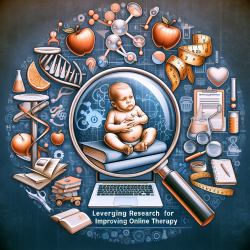You Won't Believe What This Study Reveals About Parenting Attitudes Worldwide!

Cultures and families are dynamic entities that evolve in response to social transformations such as changing gender roles, urbanization, globalization, and technology uptake. The research article "Culture and Social Change in Mothers’ and Fathers’ Individualism, Collectivism and Parenting Attitudes" by Lansford et al. (2023) delves into how these transformations affect parenting attitudes across nine countries. This blog post aims to help practitioners in online therapy, especially those working with schools, to enhance their skills by implementing the research findings or by encouraging further exploration.
Key Findings
The study surveyed mothers and fathers in nine countries—China, Colombia, Italy, Jordan, Kenya, Philippines, Sweden, Thailand, and the United States—using data from 1338 families. The researchers aimed to understand the variance in parental individualism, collectivism, progressive attitudes, and authoritarian attitudes, both within and between cultures.
Individualism vs. Collectivism
Individualism is characterized by self-reliance, while collectivism emphasizes the good of the group. The study found that:
- More variance in individualism was accounted for by between-culture factors compared to collectivism.
- Collectivism is more universally valued across cultures, driven more by within-culture factors such as personality.
Progressive vs. Authoritarian Parenting Attitudes
Progressive attitudes endorse children’s autonomy, while authoritarian attitudes emphasize obedience. The study revealed:
- Between-culture factors accounted for more variance in authoritarian attitudes than progressive attitudes.
- Decreasing authoritarian attitudes have been linked to increased education, urbanization, globalization, and technology uptake.
Sociodemographic Predictors
The most consistent predictors across cultures were parents' education levels and the importance they placed on religion:
- Higher education levels were associated with more progressive and less authoritarian attitudes.
- Greater importance placed on religion was linked to more authoritarian attitudes.
Practical Applications
For practitioners in online therapy, especially those working with diverse school populations, these findings offer several practical applications:
- Customized Interventions: Tailor interventions based on the individualism or collectivism orientation of the parents. For example, collectivist-oriented parents might respond better to interventions that emphasize community benefits.
- Educational Workshops: Conduct workshops focusing on the benefits of progressive parenting attitudes, especially in communities with lower education levels.
- Religious Context: Collaborate with religious leaders to align parenting workshops with community values, emphasizing how progressive attitudes can coexist with religious teachings.
Encouraging Further Research
Understanding the nuanced differences in parenting attitudes across cultures and sociodemographic factors is crucial for effective online therapy. Practitioners are encouraged to delve deeper into this research and consider how these factors might influence their therapeutic approaches.To read the original research paper, please follow this link:
Culture and Social Change in Mothers’ and Fathers’ Individualism, Collectivism and Parenting Attitudes.
Citation: Lansford, J. E., Zietz, S., Al-Hassan, S. M., Bacchini, D., Bornstein, M. H., Chang, L., Deater-Deckard, K., Di Giunta, L., Dodge, K. A., Gurdal, S., Liu, Q., Long, Q., Oburu, P., Pastorelli, C., Skinner, A. T., Sorbring, E., Tapanya, S., Steinberg, L., Uribe Tirado, L. M., Yotanyamaneewong, S., & Alampay, L. P. (2023). Culture and social change in mothers’ and fathers’ individualism, collectivism and parenting attitudes. Social Sciences, 10(12), 459. https://doi.org/10.3390/socsci10120459










